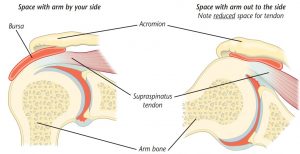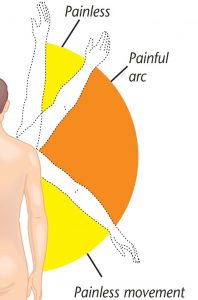Shoulder Impingement
Shoulder Impingement Is One Of The Most Common Types Of Shoulder Pain

What Causes Shoulder Pain?
Shoulder Impingement Syndrome is the most common cause of shoulder pain in the general population & with many types of sports activities. It can be very debilitating for people such as swimmers, racquet sports players and gym-goers. Throwing, bowling or pitching sports like cricket, baseball and softball are also common places to find shoulder impingement injuries.
Some occupations that involve lifting, carrying, and other repetitive tasks, especially if they are performed with the arm away from the side of the body, are also common causes of shoulder impingement. Even some common DIY tasks like painting walls or ceilings, repetitive drilling at shoulder height or above, and digging in the garden can bring on the pain.
How Does Shoulder Impingement Happen?
 The shoulder is made up of three bones: the scapula (shoulder blade), the humerus (arm bone) and the clavicle (collar bone). The joint itself is a ball-and-socket joint, and the tendons of four muscles called the rotator cuff muscles are very important to hold the ball in the centre of the socket. The supraspinatus tendon is the most common tendon to get impinged.
The shoulder is made up of three bones: the scapula (shoulder blade), the humerus (arm bone) and the clavicle (collar bone). The joint itself is a ball-and-socket joint, and the tendons of four muscles called the rotator cuff muscles are very important to hold the ball in the centre of the socket. The supraspinatus tendon is the most common tendon to get impinged.As the arm is raised, the rotator cuff muscles keep the ball of the humerus tightly in the centre of the socket of the scapula. If this position is not maintained well, the tendons of the rotator cuff may be pinched between the top of the arm bone & the bony “roof” of the scapula. This can cause irritation of the tendon which can lead to inflammation, weakness and pain. Eventually it can lead to more significant problems like tearing of the tendon.
How Do You Know If Your Shoulder Is Getting Impinged?

Many people also feel pain with twisting movements such as putting on a jacket or when reaching behind your back. When the inflammation is active you may feel pain at night and be unable to sleep comfortably on that side, and your shoulder can ache even when your arm is resting. Sometimes people describe a ‘locking’ sensation in the arm on certain movements.
What can you do to fix shoulder impingement?
Initially, avoiding painful activities to help settle your symptoms is important. If you have recently started or significantly increased your exercise regime you may just need to progress more slowly once your pain has resolved. However because most shoulder impingement is caused by an imbalance in muscle length &/or strength around the shoulder, you need to fix the underlying cause of your pain otherwise it is likely to return again in the future. This is especially true if you have had more than one episode of pain because recurrent pain strongly indicates an underlying imbalance within your shoulder, often within the rotator cuff muscles or the muscles that control your shoulder blade.
Keeping correct shoulder alignment relies a lot on keeping the right balance of length and strength within your shoulder muscles. Having a balanced gym program of pulling and pushing exercises is a great way to help achieve this. If you don’t normally go to the gym then you may need to do some extra strengthening for the muscles at the back of your shoulder, especially if you are an office worker and tend to hunch over your desk a lot. Shoulder and pec/chest stretching can also help.
If you have had a significant episode of pain, or several mild-to-moderate episodes recently, then you should get it checked out by a physio because you are very likely to have an underlying imbalance that will keep giving you problems in the future. Treating the pain when it is only recent and relatively mild is usually fairly simple. However, recurrent episodes can lead to more tendon damage requiring prolonged treatment, costly investigations such as an MRI, potentially more invasive management like cortisone, and much more time away from doing the things that you love.

